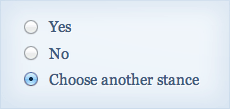Frequently Asked Questions

I disagree with the results. Is this thing accurate?
This question is usually asked by users who answer few questions (less than 15), only choose yes/no answers, and do not weight the importance of each issue. To improve the accuracy of your results, be sure to answer all questions, select the stance that most accurately reflects your beliefs by clicking "choose another stance", and weight the importance of each issue by clicking the "importance" bar to the left of each question.
These questions are way too complicated for simple yes/no answers. How am I supposed to accurately answer them?
This question is usually asked by users who have disabled javascript or do not notice the "choose another stance" option on the quiz page. Clicking "choose another stance" will show more nuanced answers and will in most cases provide more accurate results. If these answers are not satisfactory, you can “submit your own stance”. Submitting your own stance will not match any candidates but will allow us to review popular stances, match them to the candidates, and add them as an official stance.

Is this website owned by (whichever candidate/party/corporation you don’t like)?
No, we are not affiliated with any candidate, political party, corporate sponsors, investors, or interest groups. It’s just the two of us with help from users like you who support the idea of voting by issues, not sound bites.
How does the candidate match algorithm work?
Your answers are matched to each candidate’s answers based on a variable percentage scale. These variables include passion factors (How often does the candidate talk about the issue, is it a top priority in their platform, how similar is the "similar" stance to their official stance) and confidence factors (How long has the candidate held this stance, have they changed this stance in the past, does their voting record and history affirm this stance). For example, on the question "Do you support the legalization of Marijuana?" Rand Paul has been an outspoken critic of the war on drugs and has said pot users should not be put in jail. Rick Perry has said that each state should be able to decide whether to legalize marijuana. Paul has a very high match to the "Yes" answer while Perry has a very low match to the "Yes" answer.

When viewing my friends results, they answered questions that I did not get. Did they get a different quiz?
This question is usually asked by users that do not notice the "Show More Questions" link under the Economic, Foreign Policy and Domestic Issues sections on the quiz page. Clicking that link will display more questions.
Is the data on the results map a representative sample of likely voters in each state?
No, the results map and state-by-state results reflect a 3 month trailing average of users who have taken the quiz, not all users who will vote. Traditional polls call a sample of likely voters in a specific voting district and often ask direct questions about candidates and issues. The data on our map is based on how users in each state answered the iSideWith quiz.
How do you determine a candidate’s stance?
We thoroughly research the candidates stances and update them if they change during the course of the campaign. We use, and provide a link to, their most recent stated position as their official stance. Each time a candidate changes their stance they receive a lower conviction score for that issue. A candidate with a lower conviction score will not match you as strongly as a candidate who has never changed their stance on that issue.
How do you prevent tampering and duplicate submissions in your results map and state-by-state results?
We don’t publish how we prevent tampering, but we have sophisticated measures in place for finding and discarding tampered or duplicate submissions.

Some of the "similar stances" are very loosely matched. Does the algorithm consider that?
Yes, please see the question How does the candidate match algorithm work?
How can you match a candidate that constantly changes a stance?
We are constantly monitoring the election and update stances if/when they change. A candidate who is very firm on a stance is matched more strongly to that stance than a candidate who’s voting record or past actions do not match that stance. Please also see the question How does the candidate match algorithm work?
Which candidates and do you include in the results?
We include candidates that have qualified to be on the ballot in the next election in your state. We are currently featuring candidates who will appear on the ballot in the 2016 Presidential Caucuses and Primaries. In 2016 we will feature General Election Presidential Candidates, Congressional Candidates, State House and Senate Candidates and city candidates.

I took the quiz a few weeks ago. How can I retrieve my answers?
If you are using the same computer and browser you took the quiz on, there will be a button in the upper right corner of the site that says "view my results" that will take you to your results. We highly recommend you bookmark your results page after you have completed the quiz. We purposely built the site without any login features (entering your email address) to prevent privacy concerns.
Can you adapt your quiz for international and local use?
Yes. See a complete list of countries here.
What can I do to help?
1. Help us make the site better. Email us with your suggestions.
2. Tell your friends.
3. Your financial support via PayPal is what is keeping this site running.